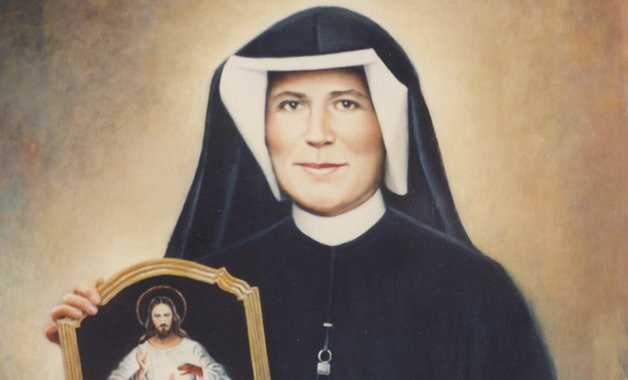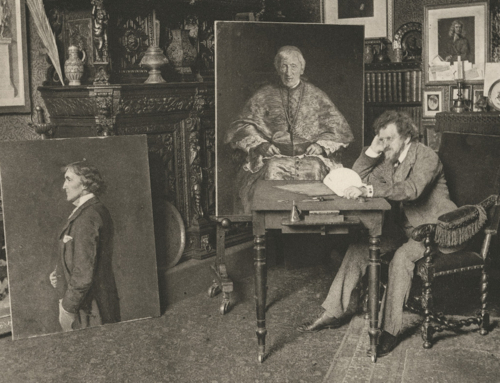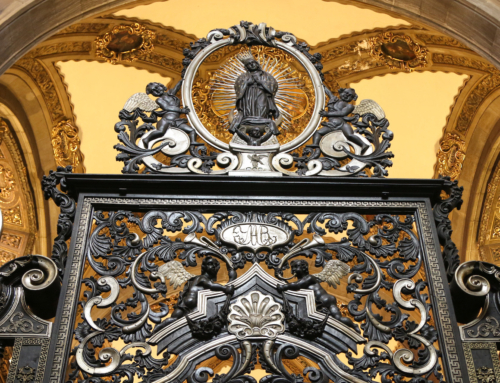I’m a big St. Faustina fan, so this year I decided to read the Diary of Saint Faustina in its entirety. I had read parts of it before, but this year I wanted to spend some serious time with Faustina. I highly recommend it, and as an encouragement I will share just one insight that I did not expect to find in her Diary.
I don’t know who told me this, but I have it in my mind that someone called St. Faustina’s spirituality “Christocentric.” I guess there is something of sense in that idea, but Mary does make a number of appearances and tells St. Faustina a thing or two. So I wouldn’t say it lacks a Marian aspect.
But what came across even stronger than the Christocentric character was what I would call the “Alter Christocentric,” or priestly, character. St. Faustina has many important and sometimes downright surprising things to say about priests! For example, she often praises the importance of priests for the sanctification of souls:
O priests, you bright candles enlightening human souls, let your brightness never be dimmed (75).
A soul which is faithful to God cannot confirm its own inspirations; it must submit them to the control of a very wise and learned priest; and until it is quite certain, it should remain distrustful (139).
Great is the divine grace that accompanies these words of the priest. The soul feels power and courage for battle (321).
Sometimes, however, she warns of the dangers and disappointments of priests who are not living up to their high calling:
When, during confession, I sense uncertainty on the part of the priest, I do not open my soul to its depths, but only accuse myself of my sins. A priest who is not at peace with himself will not be able to inspire peace in another soul (75).
I greatly pity souls who encounter inexperienced priests (596).
O Jesus, give us fervent and holy priests! Oh, how great is the dignity of the priest, but at the same time, how great is his responsibility! Much has been given you, O priest, but much will also be demanded of you (941).
Sometimes she explains what Jesus has taught her about priests, speaking in her own words:
The Lord Jesus greatly protects His representatives on earth. How closely He is united with them; and He orders me to give priority to their opinion over His. I have come to know the great intimacy which exists between Jesus and the priest. Jesus defends whatever the priest says, and often complies with his wishes, and sometimes makes His own relationship with a soul depending on the priest’s advice (1240).
And also recording the words that Jesus spoke to her:
I have come to do My Father’s will. I obeyed My parents, I obeyed My tormentors and now I obey the priests (535).
St. Faustina even has a vision of the Mother of God in which Mary reveals herself as the “Mother of God of Priests:”
In the midst of a great brilliance, I saw the Mother of God clothed in a white gown, girt about with a golden cincture; and there were tiny stars, also of gold, over the whole garment, and chevron-shaped sleeves lined with gold. Her cloak was sky-blue, lightly thrown over the shoulders. A transparent veil was delicately drawn over her head, while her flowing hair was set off beautifully by a golden crown which terminated in little crosses. On Her left arm She held the Child Jesus. A Blessed Mother of this type I had not yet seen. Then She looked at me kindly and said: I am the Mother of God of Priests (1585).
And, in what I think is one of the strangest parts of the Diary, St. Faustina even refuses to obey Jesus because of a priest’s command! The story goes like this: St. Faustina’s regular confessor was away but she felt a need to confess her plans to found a new congregation dedicated to God’s mercy, so she went and told a different priest. Upon hearing this idea for the first time, he told her all of her inspirations and encounters with Jesus were nothing but illusions. He forbade her from acting on anything Jesus told her. A day later Jesus came to her asking that she give a message to the priest. But she was obedient to the priest and said:
Jesus, I can no longer do anything You command me to do, because my confessor has told me that all this is an illusion, and that I am not allowed to obey any of Your commands. I will do nothing that You will tell me to do now. I am sorry, my Lord, but I am not allowed to do anything, and I must obey my confessor. Jesus, I most earnestly ask Your pardon (645).
Has anyone since Abraham spoken to God with such firmness? Of course this was exactly what Jesus wanted to hear and the next time she saw the confessor he had a change of heart and was receptive to her visions and inspirations.
So why all this “Alter Christocentrism?” I think it is because St. Faustina’s message of Divine Mercy is no mere abstract principle or idea aimed at making us feel good. It is a concrete proposal to the world, and accordingly needs a concrete application. And who better to implement this mercy than priests, who through absolution in the sacrament of penance bring about the forgiveness of sins and the restoration of divine life in a soul? Divine Mercy streams from Jesus’ heart, but it flows through the words and hands of his priests.
Oh, I almost forgot! St. Faustina also offers many prayers for priests, and it seems fitting to end with one of my favorites:
O my Jesus, I beg You on behalf of the whole Church: Grant it love and the light of Your Spirit, and give power to the words of priests so that hardened hearts might be brought to repentance and return to You, O Lord. Lord, give us holy priests; You yourself maintain them in holiness. O Divine and Great High Priest, may the power of your mercy accompany them everywhere and protect them from the devil’s traps and snares which are continually being set for the souls of priests. May the power of Your mercy, O Lord, shatter and bring to naught all that might tarnish the sanctity of priests, for You can do all things (1052).
✠
Image: Portrait of St. Faustina







